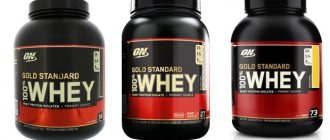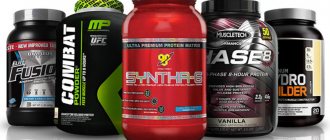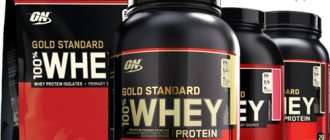Although both are derived from milk, they are very different.
This article looks at the differences between casein and whey protein, their health benefits, and which one to choose based on your needs.
What is the difference between whey protein and casein protein: comparison
Both are made from milk
Casein and whey are two types of protein found in cow's milk, making up 80% and 20% of milk protein, respectively ().
They are high quality proteins because they contain all the essential amino acids that you must get from food because your body cannot produce them. In addition, they are easily digested and absorbed ().
Both casein and whey are by-products of cheese production.
During cheese making, special enzymes or acids are added to heated milk. These enzymes or acids cause the casein in milk to coagulate (turn to a solid state), separating from the liquid substance.
This liquid substance is whey protein, which is then dried into a powder form for use in foods or dietary supplements.
Coagulated casein can be washed and dried to create protein powder or added to dairy products such as cottage cheese.
Summary:
Both casein and whey are milk proteins and by-products of cheese production.
Classification of protein supplements: purification methods
Protein can be classified based on purification and processing methods, and based on these principles, there are three main forms of protein: protein concentrate, isolate, hydrolyzate and mixtures thereof.
Protein concentrates
They are made by extracting protein from the whole food using heat and acid or enzymes. They usually contain 60–80% protein, and the remaining 20–40% are fats and carbohydrates.
If you buy pure protein concentrate, there will still be residual fats and carbohydrates in the mixture, depending on the source.
If we look at the example of the most popular whey concentrate, the protein mixture will contain residues of lactose and milk fat. Of course, this type of protein is not advisable for people with problems digesting lactose. It will also not be the best choice at the final stage of preparation for competitions, where excellent relief is needed.
However, the concentrate also has advantages! Firstly, the price - this protein is the most affordable. Secondly, it contains small amounts of immunoglobulins, which can help support immunity after a hard workout, as well as lactoferrin, which promotes the absorption of iron, which is very useful for improving blood flow and oxygen transport.
Protein isolates
An additional filtration process removes more fat and carbohydrates, further concentrating the protein. Thus, protein isolate powders already contain about 90-95% protein.
When you buy whey protein isolate, you are getting a fast-digesting product that is highly purified, free of fat and carbohydrates, and has the highest concentration of protein. It is absorbed slightly faster than whey concentrate.
Who is this supplement suitable for? This is a great product for competition preparation. Also, isolate will be the best choice for those who want to lose weight and take into account every gram of carbohydrates, especially with a pronounced tendency to gain excess weight.
Protein hydrolysates
A hydrolyzate is any protein that has been hydrolyzed, that is, broken down by heating with an acid or enzymes. This process breaks down the bonds between amino acids, so hydrolysates are absorbed faster by your body and muscles.
This is the most quickly digestible protein, in fact, it is partially “digested”. At the same time, the difference in the rate of absorption compared to isolate will be several minutes, and this is important for professional athletes. In addition, hydrolysates are often additionally enriched with glutamine, BCAAs, arginine and other individual amino acids. The result is an excellent, quickly absorbed mixture of amino acids and broken down protein, saturating the body after training. They will also be an excellent choice for people with digestive disorders - because the body will not have to spend a lot of energy processing and assimilating them.
Whey Protein Is Better Than Casein Protein for Building Muscle
Whey protein is not only better for training because it digests quickly, but it also has a better amino acid profile.
It contains more branched chain amino acids (BCAAs), leucine, isoleucine and valine, while casein contains a higher proportion of the amino acids histidine, methionine and phenylalanine ().
While all essential amino acids are important for building muscle, leucine is the amino acid that speeds up the process ().
Thanks in part to its higher leucine content, whey protein stimulates muscle protein synthesis (the process by which muscles grow) more than casein, especially when you consume it in tandem with your workouts (, , ).
However, it is unknown whether this greater stimulation of muscle protein synthesis translates into increased muscle growth in the long term.
It's pretty clear that your total protein intake for each day is the strongest predictor of muscle size and strength ().
Summary:
The amino acid profile of whey protein may stimulate the muscle building process more than the amino acid profile of casein.
Unusual protein studies on police officers
Scientists from the USA R.H. Demling and L. DeSanti conducted studies comparing whey and casein. In their report, they published "the effects of strength training, a low-calorie diet, and increased protein intake on the growth of lean muscle mass, as well as the reduction and gain of fat mass of policemen," which showed that casein was better than whey protein for the growth of muscle mass and strength. , as well as for weight loss.
Syntha-6 Isolate (BSN)
In total, the experiment lasted 12 weeks , in which 38 police officers participated (from among active patrol officers, not desk officers), average age - 34 years , average weight 98 kg, 27% of officers were overweight.
The police were divided into three groups:
- The first group , consisting of 10 police officers, followed a low-calorie diet, approximately 75-85% of the daily kcal requirement, taking into account each subject's metabolism. Thus, their diet contained at least 0.8 grams of protein per 1 kg of weight.
- The second group consisted of 14 officers who not only went on a diet, but also went to the gym regularly. Their menu already included 1.5 grams of protein per 1 kg of weight, of which 75 grams they received from a protein (whey) shake.
- The third group , of 14 police officers, also exercised regularly and ate the high-protein diet described above, but instead of whey, they took 75 grams of casein. For the experiment, two different types of protein (whey and casein) were purchased from a well-known sports nutrition store.
Casein Pro Universal
In addition, all participants in the experiment took high doses of vitamins and minerals every day. Police officers in their diets received 25% of their total calories from fat. The last meal and before bedtime accounted for 20-25% of all kcal, the rest (70-75%) was consumed by participants during the day, during vigorous activity. The diet included mainly complex carbohydrates (2/3).
Before the study, 70% of participants consumed more than 50% of their total calories before bed , and less than 10% in the morning. Carbohydrate consumption accounted for 60% of all kcal, of which 30% were fast (sugars), more than half of which were consumed before bedtime. 75% of the subjects consumed a small amount of protein, less than the recommended amount, 0.8 grams per 1 kg of weight, and only 10% took any vitamins.
Strength training in the gym took place 4 times a week , which was aimed at working out the main muscle groups (30-35 minutes per group). Aerobic training , exercises (running, swimming, walking, jumping rope, etc.), should have been performed immediately after strength training, or the next day. The training program did not provide for any other specifics.
Both contain various beneficial compounds
Casein and whey protein contain various bioactive peptides, which are compounds that benefit your body ().
Casein protein
Casein contains several bioactive peptides that have been shown to benefit your immune and digestive systems (,).
Some bioactive peptides found in casein also benefit your heart by lowering blood pressure and reducing blood clots (,).
These peptides work similarly to angiotensin-converting enzyme (ACE) inhibitors, a class of drugs commonly prescribed to control blood pressure.
They also bind and transport minerals such as calcium and phosphorus, improving their absorption in your gastrointestinal tract (,).
Whey Protein
Whey protein contains a number of active proteins called immunoglobulins, which strengthen your immune system ().
Immunoglobulins in serum are known to have antimicrobial properties, killing or inhibiting the growth of harmful microbes such as bacteria and viruses (,).
Animal and test-tube studies have also shown that these proteins have antioxidant effects and inhibit the growth of tumors and cancer (, ).
In addition, some immunoglobulins transport important nutrients (such as vitamin A) throughout your body and enhance the absorption of other nutrients such as iron ().
Summary:
Casein and whey protein contain various bioactive compounds that benefit your health in a variety of ways.
Health Benefits of Protein
Protein serves many important roles in your body, making it incredibly important to your health.
These are the roles that protein plays in your body ():
- Enzymes : Proteins carry out chemical reactions in your body.
- Antibodies : These remove foreign particles such as viruses, helping to fight infection.
- Nerve signaling : Many proteins are hormones that coordinate cell signaling.
- Structure : They provide shape and support to your skin, bones and tendons.
- Transport and Storage : These proteins move substances, including hormones, drugs, and enzymes, through your body.
In addition to the basic nutritional functions of your body, protein has a number of other properties, including:
- Reduce Fat Mass : Protein helps reduce fat mass by reducing your appetite and speeding up your metabolism (, ,).
- Blood sugar control : Protein consumed instead of carbohydrates may improve blood sugar control in people with type 2 diabetes (,).
- Blood Pressure : Research shows that people who eat more protein, regardless of the source, have lower blood pressure (, ,).
These beneficial effects are associated with higher protein intake in general, not necessarily casein or whey.
Summary:
Protein plays a vital role in your body by acting as enzymes and antibodies, and also regulates blood sugar and blood pressure.
Different Types of Casein Protein: Type A1 and A2 Casein
Milk contains about 85% water and 15% sugar (lactose), proteins, fats and minerals. Among the protein compounds in milk, there is more than one type. A2-beta casein is a type that has been naturally produced by animals for thousands of years, even before they were first domesticated over 10,000 years ago. It is thought to be easier to digest, and some studies suggest it has far less impact on human health than another type called A1 casein.
A1 is a “new type of casein” that first appeared in the last few thousand years after the domestication of animals. This happened after certain genes caused the proteins to change, causing the amino acid proline to switch to histidine. Today, A1 beta-casein is more common in dairy cows, which produce the vast majority of milk in Western countries.
Every cow has a specific genotype, A1/A1, A1/A2, or A2/A2, which ultimately affects the milk it produces. Preferably consume dairy products, including all dairy products and whey/casein protein supplements, derived from cows (or goats), which predominantly contain A2 casein.
When A1 beta-casein caused a shift from proline to histidine amino acids, it led to problems with the digestion and proper metabolism of milk in humans. In fact, most people who are intolerant to cow's milk are sensitive to one of the proteins it contains: A1 casein. They essentially lack the ability to digest this type of casein. This intolerance is now associated with a wide range of diseases, including autoimmune reactions, food allergies, digestive problems, type 1 diabetes, heart disease and more. A1 is also thought to promote inflammation. However, milk that contains mostly or exclusively A2 casein has much less (or no) inflammatory effects.
How do you know if you are consuming casein or whey protein from A1 or A2 cows? There is great diversity in the herd of mixed breed dairy cows that are considered to produce A2 milk, including Jersey, Guernsey, Brown Swiss, Milking Shorthorn, Friesian and others. Purchasing products made from these breeds (and ideally species that are labeled organic and grass-fed) should result in lower amounts of A1 beta casein. Some protein supplements combine milk proteins into one product.
Which protein is better, whey or casein?
Despite their different bioactive components, whey and casein proteins differ little when it comes to their nutritional value.
A standard 31g scoop of whey protein contains ():
- Calories: 110 kcal.
- Fat: 1 g.
- Carbohydrates: 2 g.
- Protein: 24 g.
- Iron: 0% Recommended Daily Intake (RDI).
- Calcium: 8% of the RDI.
A standard scoop (34 g) of casein protein contains ():
- Calories: 120 kcal.
- Fat: 1 g.
- Carbohydrates: 4 g.
- Protein: 24 g.
- Iron: 4% of RDI.
- Calcium: 50% of the RDI.
Keep in mind that these nutrition facts may vary depending on the specific brand you buy, so be sure to read labels carefully.
Moreover, there are other factors:
- Casein protein powder is usually more expensive than whey protein powder.
- Whey protein powder tends to mix better than casein protein powder.
- Whey protein often has a better consistency and taste than casein protein.
You can also buy protein powders, which usually contain a combination of casein and whey, giving you the benefits of each.
Alternatively, you can buy both powders individually and take the whey protein during or after your workout (see When is the best time to take protein) and the casein protein before bed.
How to use
You can mix each type of protein with water or milk. Milk will thicken your protein shakes (especially casein shakes).
If possible, mix the protein powder and liquid in a blender bottle or regular blender rather than using a spoon. This will ensure a more even consistency and dispersion of the protein.
Always add the liquid first and then the scoop of protein. This order keeps the whites from sticking to the bottom of your container.
Summary:
Casein and whey proteins offer unique benefits. When you compare which one is better, you can also consider cost, mixability, and taste. Moreover, you can mix both types together.
Casein
Casein is one of the proteins in milk. Actually, it is one of the main components of this liquid. The main feature of casein is its unusual texture - the protein molecules are “packed” into small globules-micelles that do not dissolve in water and take a long time to digest. Some forms take up to 7 hours to absorb!
As a result, casein extremely slowly replenishes protein reserves in the body. Therefore, it is recommended to take it in cases where you plan not to eat for a long time. For example, drink a casein-based drink before bed.
In addition, casein is characterized by excellent anti-catabolic properties. Taking it protects muscles from destruction if for some reason it is not possible to replenish the necessary supply of BJU in the body. Not only before bed, of course, but also during trips or at the beginning of the working day, if you can’t take a lunch break.
In general, casein is characterized as follows:
- Slow Digestion
. It can remain in the digestive system for up to 7 hours, after which it will break down into the necessary nutrients and begin to participate in the “construction” of muscle tissue;
- Long-term anti-catabolic effect
. It is precisely because of its slow metabolism that casein helps to cope with the destruction of muscle tissue that occurs due to lack of nutrients due to prolonged periods without food;
- Low price.
Casein is easy to extract and obtain; a lot of it is obtained from milk, and therefore the cost of the finished powder is quite low. If anything, it's cheaper than some other protein brands.
It is worth noting that casein is available in three forms:
- Caseinate. A combination of casein with three simple substances - calcium, potassium and sodium. It is distinguished by its easy solubility, which makes it the easiest to prepare. Dry matter contains up to 90% protein;
- Micellar casein (MC). It is extracted using low-temperature microfiltration technology. Capable of forming micelles even after drying - upon subsequent contact with water - and therefore does not dissolve well. It has the longest absorption time, which is up to 5-7 hours, so it is suitable for preparing drinks consumed before bed;
- Hydrolyzed casein protein (HCP). As the name implies, this is casein that has undergone hydrolysis. Thanks to this, its structure is devoid of micelles, and it becomes easy to digest. GCP metabolizes as quickly as other protein brands, making it ideal for pre- and post-workout use. It has an unpleasant bitter taste.
You should choose the right casein based on your intended use. MK is the basis for drinks consumed before bed, GCP is for taking before and after training, and caseinate is for replenishing the lack of protein in the daily diet.
So, let's summarize.
Advantages
- Low price for most varieties of casein. Only GKP is somewhat expensive;
- Excellent anti-catabolic effect during irregular eating or during night sleep.
Flaws
- Not suitable for preparing drinks consumed before or after workouts;
- GKP has an unpleasant bitter taste and is relatively expensive.
It is very important to choose the right type of casein. Only in this case will it reveal its anti-catabolic effect and become useful and practical.
Summarize
- Casein and whey proteins are obtained from milk.
- They differ in digestion time - casein digests slowly, making it good to take before bed, while whey digests quickly and is ideal for training and muscle growth.
- Both contain various bioactive compounds that can boost your immune system and offer other benefits.
- Preferring one over the other won't necessarily give you better results in the gym or noticeably improve your health, so choose the one you prefer or buy a blend that contains both types of protein.
- First of all, remember that your total daily protein intake matters the most.
- While casein and whey have their differences, each of these types of protein plays an important role in your body and provides numerous health benefits.
The article was prepared by experts for informational purposes only. It should not be used as a guide for treating medical conditions and is not a substitute for professional medical advice, diagnosis, or treatment. In case of illness or any symptoms, you should always consult a doctor and not self-medicate.
Tags: Protein
About the author: Larisa Kuts
Board-certified physician specializing in family medicine, geriatrics and integrative medicine. Clinical experience as a physician ranging from disease management to family practice and emergency care.
- Related Posts
- Could biotin cause acne?
- Why is potassium needed in the human body?
- What are saturated fats and are they harmful?
« Previous entry
When should you take protein?
Fast-digesting whey protein is great for pre- and post-workout use. It will quickly fuel your muscles with minimal risk of stomach upset. Casein is best used when you are not going to eat for a long time, for example before bed or before a long meeting, it will provide a long-term supply of amino acids and a feeling of fullness.










